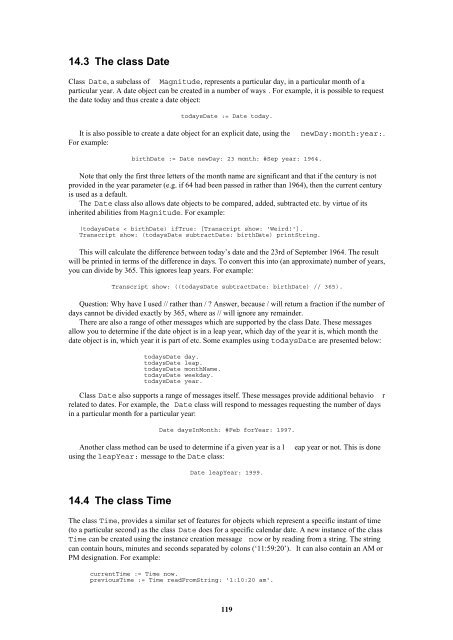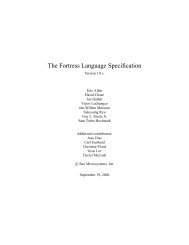Smalltalk and Object Orientation: an Introduction - Free
Smalltalk and Object Orientation: an Introduction - Free
Smalltalk and Object Orientation: an Introduction - Free
You also want an ePaper? Increase the reach of your titles
YUMPU automatically turns print PDFs into web optimized ePapers that Google loves.
14.3 The class Date<br />
Class Date, a subclass of Magnitude, represents a particular day, in a particular month of a<br />
particular year. A date object c<strong>an</strong> be created in a number of ways . For example, it is possible to request<br />
the date today <strong><strong>an</strong>d</strong> thus create a date object:<br />
todaysDate := Date today.<br />
It is also possible to create a date object for <strong>an</strong> explicit date, using the<br />
For example:<br />
newDay:month:year:.<br />
birthDate := Date newDay: 23 month: #Sep year: 1964.<br />
Note that only the first three letters of the month name are signific<strong>an</strong>t <strong><strong>an</strong>d</strong> that if the century is not<br />
provided in the year parameter (e.g. if 64 had been passed in rather th<strong>an</strong> 1964), then the current century<br />
is used as a default.<br />
The Date class also allows date objects to be compared, added, subtracted etc. by virtue of its<br />
inherited abilities from Magnitude. For example:<br />
(todaysDate < birthDate) ifTrue: [Tr<strong>an</strong>script show: 'Weird!'].<br />
Tr<strong>an</strong>script show: (todaysDate subtractDate: birthDate) printString.<br />
This will calculate the difference between today’s date <strong><strong>an</strong>d</strong> the 23rd of September 1964. The result<br />
will be printed in terms of the difference in days. To convert this into (<strong>an</strong> approximate) number of years,<br />
you c<strong>an</strong> divide by 365. This ignores leap years. For example:<br />
Tr<strong>an</strong>script show: ((todaysDate subtractDate: birthDate) // 365).<br />
Question: Why have I used // rather th<strong>an</strong> / ? Answer, because / will return a fraction if the number of<br />
days c<strong>an</strong>not be divided exactly by 365, where as // will ignore <strong>an</strong>y remainder.<br />
There are also a r<strong>an</strong>ge of other messages which are supported by the class Date. These messages<br />
allow you to determine if the date object is in a leap year, which day of the year it is, which month the<br />
date object is in, which year it is part of etc. Some examples using todaysDate are presented below:<br />
todaysDate day.<br />
todaysDate leap.<br />
todaysDate monthName.<br />
todaysDate weekday.<br />
todaysDate year.<br />
Class Date also supports a r<strong>an</strong>ge of messages itself. These messages provide additional behavio r<br />
related to dates. For example, the Date class will respond to messages requesting the number of days<br />
in a particular month for a particular year:<br />
Date daysInMonth: #Feb forYear: 1997.<br />
Another class method c<strong>an</strong> be used to determine if a given year is a l<br />
using the leapYear: message to the Date class:<br />
eap year or not. This is done<br />
Date leapYear: 1999.<br />
14.4 The class Time<br />
The class Time, provides a similar set of features for objects which represent a specific inst<strong>an</strong>t of time<br />
(to a particular second) as the class Date does for a specific calendar date. A new inst<strong>an</strong>ce of the class<br />
Time c<strong>an</strong> be created using the inst<strong>an</strong>ce creation message now or by reading from a string. The string<br />
c<strong>an</strong> contain hours, minutes <strong><strong>an</strong>d</strong> seconds separated by colons (‘11:59:20’). It c<strong>an</strong> also contain <strong>an</strong> AM or<br />
PM designation. For example:<br />
currentTime := Time now.<br />
previousTime := Time readFromString: '1:10:20 am'.<br />
119
















